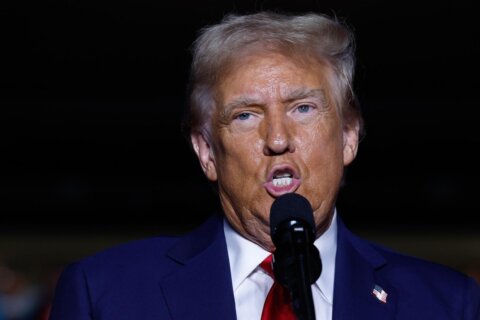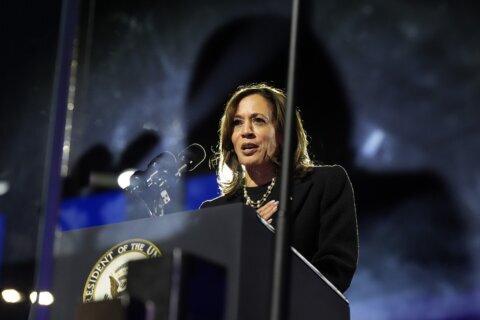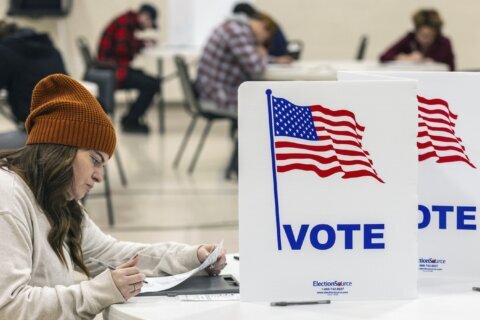The following information is provided by Graphiq and RealClearPolitics.

Former Secretary of State Hillary Clinton and businessman Donald Trump continue to hold double-digit leads in New York going into that state’s primary on April 19. With such strong polling numbers pointing to wins for the two front-runners, the biggest question for Tuesday’s vote is how many delegates the winners — and losers — can hope to secure. Both the Democratic and Republican nomination races are turning into a down-to-the-wire math test where every delegate counts.
As of April 18, Clinton leads Vermont Sen. Bernie Sanders 53.6 percent to 41.6 percent, according to polling averages from RealClearPolitics. Although Sanders was born and raised in Brooklyn, the state has been considered home turf for Clinton, who represented New York in the U.S. Senate from 2001 to 2009.
After a spotty start to March, Sanders has notched some momentum-shifting victories, moving into April with seven consecutive wins. He hosted a giant rally in Manhattan’s Washington Square Park last week and another one in Brooklyn’s Prospect Park on Sunday, where the Sanders campaign estimated that more than 28,000 people showed up. Earlier that day, Sanders spoke at First Corinthian Baptist Church, a predominantly African-American church in Harlem, where he talked about criminal justice reform and economic inequality.
The Sanders campaign continues to hedge on the New York outcome, telling supporters in an email blast on Sunday, “We don’t have to win New York on Tuesday, but we have to pick up a lot of delegates.” The Empire State has 291 Democratic delegates, so if the results are close, Sanders could still add a sizable number to his total.
As the InsideGov visualization shows, Sanders has 1,045 pledged delegates compared to Clinton’s 1,289 leading up to the New York primary. That gap widens when accounting for superdelegates — Clinton has 1,758 total delegates to Sanders’ total of 1,076. The Democratic nominee needs 2,383 delegates to win.
Clinton and her surrogates fanned out across New York in the days leading up to the primary. Former President Bill Clinton spoke in Syracuse on Saturday, and Minnesota Sen. Amy Klobuchar campaigned in the same area a few days later. Hillary Clinton visited Staten Island and Brooklyn on Sunday, focusing her comments on gun control, an issue she has used consistently to brandish her progressive bona fides. In Long Island, former Arizona Rep. Gabrielle Giffords and her husband, astronaut Mark Kelly, also spoke about gun control as they campaigned for Clinton. Giffords, a Democrat out of Tucson, was shot in the head during a meet-and-greet in her district in 2011.
Clinton also squeezed in a California fundraising swing at the end of last week. Her two stops in San Francisco and Los Angeles reportedly brought in about $15 million. Protesters and Sanders supporters met Clinton during her Golden State stops, throwing dollar bills at her motorcade at one point. Sanders also countered with ad buys in the Bay Area and Los Angeles, with a TV spot called “$27,” the amount the Sanders campaign says is the average contribution to his campaign. On Saturday, the campaign sent out a fundraising email promoting the ad.
Sanders isn’t the only presidential hopeful aiming to narrow the front-runner’s advantage in order to snag a handful of delegates. On the Republican side, Ohio Gov. John Kasich and Texas Sen. Ted Cruz are looking to nibble away at Trump’s daunting lead. As of April 18, Trump was up by about 30 points in the polls.
Cruz and Kasich have bounced around New York in the days leading up to the primary. Cruz hasn’t been able to shake off his comment about “New York values” that he made during a debate in January, and was met with protesters during a stop in the Bronx in early April. But the Texas senator is finding success elsewhere, collecting delegates at state conventions in Wyoming and Colorado.
Kasich, for his part, has gone on a one-man foodie tour of New York to win the hearts and minds of voters there. He ate pizza (with a knife and fork) in Queens, a deli sandwich in the Bronx and soup and pickles on the Upper East Side.
But it hasn’t been all apple strudel and Italian cold cuts. During a town hall in Watertown, when a college student posed a question about sexual violence, Kasich said, “Don’t go to parties where there’s a lot of alcohol.” The Kasich campaign later clarified on Twitter that only the assailant is at fault in a sexual assault.
For Republicans, 95 delegates are up for grabs in the New York primary. Overall, Trump currently leads with 744 delegates, and Cruz is in second place with 559. Kasich is in a distant fourth place, with 144 delegates (Florida Sen. Marco Rubio, who dropped out of the race in March and is therefore not included in the visualization, has the third-most delegates at 171).
A strong showing on Tuesday for Cruz or Kasich would boost their bottom line, but it would also put up another hurdle in Trump’s path to the 1,237 needed delegates. Republicans who don’t support Trump are hoping the real estate mogul won’t reach the necessary total before the party’s convention in July. That would result in a contested convention, where delegates would vote — and potentially re-vote multiple times — at the meeting in Cleveland for their preferred candidate until one receives a majority.
After the New York primary on April 19, a batch of Northeastern states will hold their primaries on April 26.
More: These Donors Are Giving Millions to Pro-Clinton Super PACs
Follow InsideGov on Twitter: @inside_gov
Research More About the 2016 Election







